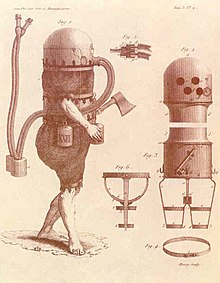Karl Heinrich Klingert
Karl Heinrich Klingert (born January 16, 1760 in Herrnprotsch b. Breslau , † March 1, 1828 in Breslau) was a German mechanic and inventor .
Life
Father Klingert ran a small brandy distillation northwest of Wroclaw. Heinrich Klingert attended the Maria-Magdalenen-Gymnasium in Breslau for four years . Johann Friedrich Täsch, Royal Prussian War and Domain Chamber Mechanic and Optician, was a teacher at the Magdalenäum at the time. He recognized the talents of his student Klingert. And so a six-year training followed in the mechanical workshop of Täsch, which was attached to the grammar school and which Klingert then took over after the death of his teacher. Klingert was primarily interested in chemical physics , thermal and fluid mechanics , galvanic energy generation and hydraulics and its effects. For his invention, which dealt with cavitation , he was made an honorary member of the " Leipzig Economic Society " in 1798 . His inventions were not commissioned. The practical implementation cost money and he didn't have any sponsors. Without worrying about the daily bread, the name Klingert would perhaps have been associated with even greater success by posterity. His marriage (probably before) 1785 had a daughter. Karl Heinrich Klingert died as a royal Prussian government mechanic at the age of 68.
Services
The technology pioneer Klingert built the first electric clock (1815), the first electric motors, a hydraulic ram , but also aids for the sick and disabled , based on a Zambon column . So he invented a thermometer and a compass for the blind . A diving device developed by Klingert proved its usefulness when a diver equipped with it sawed through a tree trunk in the Oder. And as early as 1799 he built an artificial arm for a man who shot his right arm while hunting. In 1803 the mechanic was made an honorary member of the philosophical faculty of the University of Wroclaw . In 1803 Christian Heinrich Müller (1772–1849) founded a society that from 1809 on was called the “ Silesian Society for Patriotic Culture ”. Müller had also attended Maria-Magdalenen-Gymnasium from 1778 to 1791 and met Klingert there in the mechanical workshop. He became one of the first members of this society, which enjoyed great national and international reputation. It replaced the Academy of Sciences and Arts, which was missing in Silesia. Honorary members included Johann Wolfgang von Goethe (1822) and Alexander von Humboldt (1827). By 1827, about 40 essays by Klingert had appeared in various of the Society's publications. The “diving machine” is probably his most famous invention.
Publications
- KH Klingert: Description of a diving machine that can be used in all rivers . Wroclaw 1797
- KH Klingert: A short addendum to the history and description of a diving machine along with an explanation of a lantern or lamp that burns in any foul air and water . Wroclaw 1822
- KH Klingert: Advertisement of a newly invented tool for brushing teeth in racks and cylinder tubes for use in mathematical instruments . Wroclaw 1826
- In Gilbert's Annals d. Physics , Halle, Vol. 2, 1799; Vol. 4, 1800; Vol. 5, 1800; Vol. 7, 1801; Vol. 53, 1816
literature
- Michael Jung: Karl Heinrich Klingert. Diving history compendium . Merzig-Weiler 1998
- Encyclopedia Wrocławia . Wrocław 2001
- Günter Christmann: Karl Heinrich Klingert (1760-1828). A Wroclaw Leonardo. In: Schlesien heute , Senfkorn-Verlag, Görlitz, No. 149, issue 2/2011, pp. 40–42
Web links
- Berlin-Brandenburg Academy of Sciences
- Literature by and about Karl Heinrich Klingert in the catalog of the German National Library
| personal data | |
|---|---|
| SURNAME | Klingert, Karl Heinrich |
| BRIEF DESCRIPTION | German mechanic and inventor |
| DATE OF BIRTH | January 16, 1760 |
| PLACE OF BIRTH | Herrnprotsch b. Wroclaw |
| DATE OF DEATH | March 1, 1828 |
| Place of death | Wroclaw |

